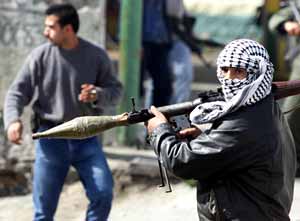
An Israeli soldier aims his weapon from a window in Ramallah
Sharon's actions are not necessarily contradictory. He knows the U.S. will face pressure to restrain Israel from the Arab regimes Dick Cheney is lobbying this week for help in the fight against Saddam Hussein. Raising the ante ahead of Zinni's visit allows Sharon to paint the inevitable retreat from Palestinian areas recently reoccupied as a concession. More important, the Israelis believe — with good reason — that no matter what cease-fire agreement is reached, Yasser Arafat will be unable or unwilling to take down Hamas and Islamic Jihad, much less to disarm the militias linked to his own Fatah movement. The Israelis may be trying to get as much of the job done themselves before Washington requires a tamping down of hostilities.
Despite killing more than 200 alleged militants and arresting around 2,000 more, Israel's invasions of Palestinian towns such as Ramallah and refugee camps in the West Bank and Gaza do not appear to have achieved the desired results. Israeli analysts noted that Palestinian militants preserved much of their fighting capability by avoiding full-on clashes with Israeli forces. And even in the course of the current operations in the West Bank and Gaza, Palestinian gunmen and suicide bombers have struck repeatedly inside Israel, as if to send the message that the Israeli raids could not deter them.
The rising tide of bloodshed on Israel's streets has played badly for Sharon in domestic politics, where he is increasingly vulnerable to mounting pressure from the right to take a harder line with the Palestinians. Two far-right members of his cabinet resigned Tuesday, and the prime minister is no longer the favored candidate of his own party come election time. That may leave him overly reliant on the relatively more dovish Labor Party, to avoid having to call new elections. But the edge of the envelope in Israeli realpolitik is determined by Washington, and Sharon has little choice now but to walk back from his chokehold on Arafat and begin anew the cease-fire dance. Still, the respite may be temporary.
Arafat has no political authority over the Islamists, and they remain fiercely opposed to any new cease-fire. That, and the rage of the Palestinian public stirred by the latest Israeli operations, suggest they'll try to cut short Zinni's visit (and spoil Cheney's) with a series of terror outrages in Israel's cities. Even the militants of Arafat's own Fatah organization now believe that armed struggle is more effective than U.S.-brokered negotiations.

JAMAL ARURI/AFP
A Palestinian gunman holds up a rocket propelled grenade in Ramallah |
The prospect of a cease-fire has forced Arafat and Sharon to confront some uncomfortable strategic dilemmas. Sharon lifted travel restrictions on Arafat and dropped his demand for seven days of quiet before cease-fire talks. Arafat made it a little easier for the Israeli leader by arresting the last key suspect in the slaying of an Israeli cabinet minister.
While Arafat is supposed to disarm the militias, he may see at least some of them as a strategic reserve. Their armed actions in the West Bank and Gaza over the past six weeks have certainly helped stoke the crisis that brought the Americans rushing back to rehabilitate Arafat. The Palestinian leader is no more likely to trust Sharon than vice versa, and he's unlikely — and quite possibly unable — to relinquish his capability to make life intolerable for the Israelis in the West Bank and Gaza.
Sharon is faced with the prospect that in the U.S. perspective, a cease-fire is but a way station en route to renewed land-for-peace political negotiations. As a longtime opponent of Oslo and champion of the settlers, that's not an idea the Israeli leader can love. But, of course, it won't come to pass if Palestinian militants continue to blow themselves up in downtown Tel Aviv.
The best-case scenario for General Zinni is a cease-fire agreement and adoption of the Saudi peace plan at the March 27 Arab League summit in Beirut. That?s not going to happen while bombs are going off in Israel, Israeli tanks are rumbling through Palestinian refugee camps and Arafat is prevented from even traveling to Beirut. As General Zinni knows from experience, best-case scenarios seldom pan out in the Middle East.
